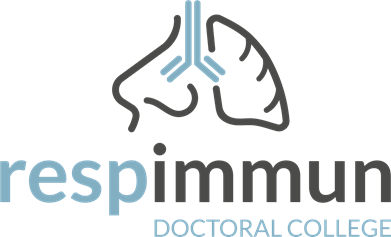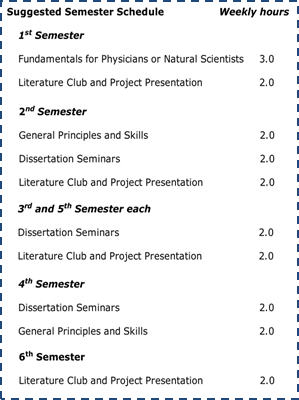
Training ⏩


Training Program
 The curriculum of PhD studies of
the
The curriculum of PhD studies of
the - First, PhD students should rapidly acquire all the fundamental skills and background knowledge needed
for scientific research. Additionally, they should obtain broader insights into biomedical science
beyond the scope of their individual research projects,
i. e. receive a broad overview on different state-of-the-art approaches and novel concepts pertinent to inflammation, respiratory physiology and pathology. - Second, newly enrolled PhD candidates are likely to have different educational backgrounds. Thus it is a major task of the training to alleviate such disparities and provide PhD researchers with a common scientific vocabulary. Graduates from medical schools might not be equally versed in natural sciences and technical skill, while graduates from the life sciences benefit from an overview of medical terminology, physiology, pathology and pharmacology, and clinical processes. To this end, students attend either the workshop ‘Basics in molecular biology’ or the ‘Introduction to clinical medicine’.
- The third major goal of the training activities is to foster the contact and communication among students to facilitate the exchange of concepts and technical skills.
Research training and technical skill set
Scientific research project: The core element of the training is the thesis project. The majority of time is spent in the laboratory performing hypothesis-driven cutting-edge research in close contact with their supervisors and RESPImmun faculty members.Basics in molecular biology: MD students learn biochemical, molecular and cell biological concepts and commonly used laboratory methods. Theoretical knowledge includes the genomic organization, (sub)cellular structure and signal transduction. The practical part addresses basic molecular biological techniques and cutting-edge omics-approaches.
Introduction to clinical medicine: The course covers pathobiology of the major inflammatory and neoplastic diseases of the lung. It gives insight into different clinical processes and problems including current unmet medical needs thereby illustrating the importance of basic inflammation research in respiratory medicine.
Virtual lab visits: These seminars deliver profound insights into the research landscape and technical circumstances of the consortium, develop personal and professional networks and initiate first collaborations. All RESPImmun faculty members introduce their research topic and discuss their research data. Advanced PhD students and postdocs give detailed overviews of available methodologies.
Statistics, data management plan and open data policy: Students will be introduced to the fundamentals of biostatistics including a standardized data management plan how to record, analyze and store their data. This implements full quality control, facilitates the exchange of data sets and secures long-term availability of results.
Research integrity, ethics and responsible research: A strict sense of research integrity must be attained from the very beginning and students must observe national/international codes of ethics and good scientific/clinical practice.
Clinical trials and evidence-based medicine: To understand the scientific background of state-of-the-art clinical procedures and where unmet clinical needs still exist, students will gain insights into the most relevant clinical trials and how findings were translated into clinical routine. To furnish students with a solid translational foundation, additional structured courses will cover crucial aspects of translational medicine: a) biobanking and ethics (Christian Gülly, head of biobank), b) clinical study design (held by Horst Olschewski), c) (patho)physiology of the lung (Grażyna Kwapiszewska, Gerald Höfler, Leigh Marsh, Andrea Olschewski, Katharina Leithner), and d) immunopharmacology (Herbrert Strobl, Ákos Heinemann, Julia Kargl).
Additional training goals
Bioinformatics: A course dealing with big data “system approaches” which will be held by Gerhard Thallinger (Institute of Computational Biotechnology, Technical University of Graz), Jochen Wilhelm from the ECCPS, Gießen, Germany, and Alexander Avian (Med Uni Graz, Austria).
Scientific presentations and discussions: Compelling presentation of own research data and ability to
critically discuss the work of peers is a crucial requirement in scientific life. RESPImmun provides:
Workshop on scientific presentations skills, journal clubs, work-in-progress technical workshops, and the annual
RESPImmun retreat. The students will gain a solid foundation of the pathomechanisms and current treatment
options of all respiratory diseases in the series of lectures, courses and discussion panels which will build on
the current PhD curriculum at the
Teaching experience: Students in their third year are given the opportunity to act as tutors for undergraduate and beginner students in methodological courses, or as co-supervisors of master students.
Academic spirit and scholarship: Specific funds are provided by RESPImmun to foster the participation of PhD researchers on international conferences/workshops and to invite renowned international guest speakers.
Career management: As not all PhD graduates will continue an academic career, an individual career development plan will be created after the second yearLink). RESPImmun will offer workshops on CV writing and interview techniques, job and grant applications.
Personal and complementary skills: Networking, project management and organisational skills, communication skills/presentation techniques (written and verbal), and intercultural communication are offered by the LBG-Career Center (Link1 and Link2).
Industrial orientation: PhDs will be also introduced and exposed to work within the private sector.
RespImmun PIs have existing collaborations with several pharmaceutical companies (